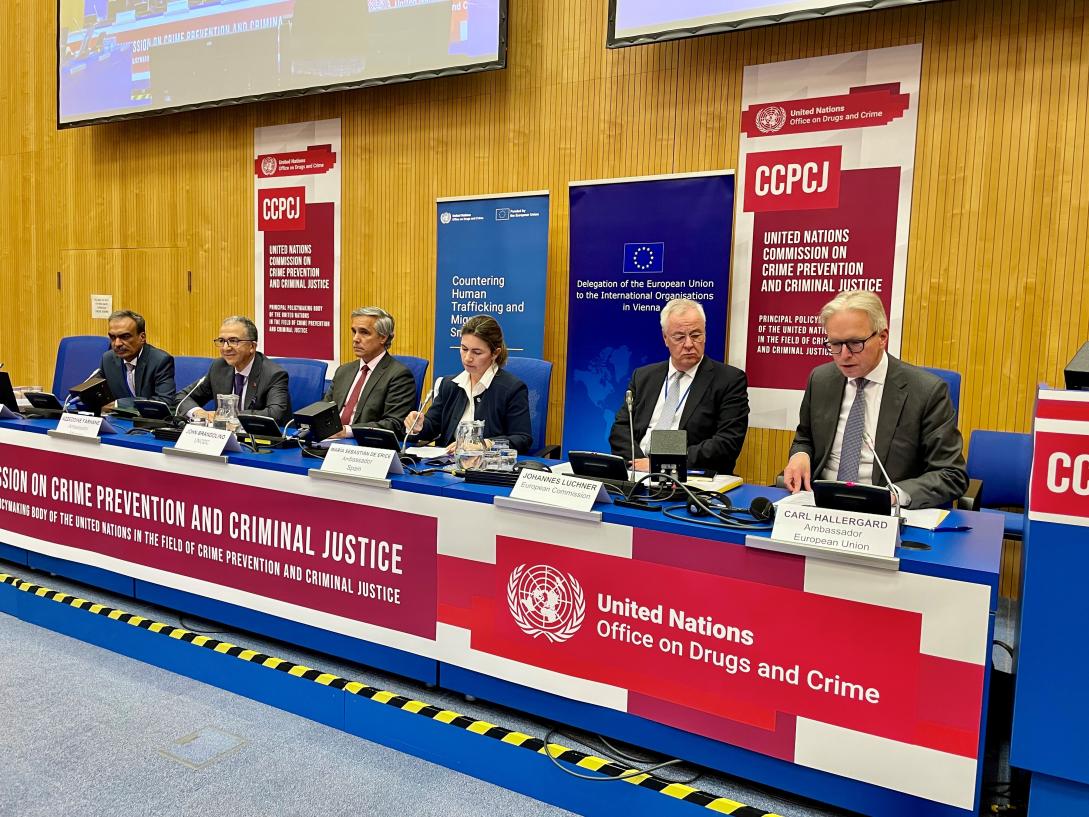Web Story: EU-UNODC side event on “Combating migrant smuggling in the digital era: advancing cooperation and collective action”, 21 May 2025

It is within this challenging context that, on the margins of the 34th session of the Commission on Crime Prevention and Criminal Justice (CCPCJ), the EU together with the United Nations Office on Drugs and Crime (UNODC), as well as Morocco, Pakistan and Spain, organised a side event on “Combating migrant smuggling in the digital era: advancing cooperation and collective action”
The event was opened by EU Ambassador to the UN in Vienna, H.E. Carl Hallergård, who set the stage for the intervention of Mr Johannes Luchner, Deputy Director General of the Directorate-Generale for Home Affairs and Migration of the European Commission. DDG Luchner recalled the launch of the Global Alliance to Counter Migrant Smuggling and recognised that migrant smuggling networks are often highly adaptable, using online methods, document fraud, and underground payment systems to conduct their business activities. Even though exact figures are unknown, migrant smugglers are estimated to earn between EUR 4.7 to 6 billion annually worldwide.
Apart from reiterating the importance of preventing the smuggling of migrants and strengthening governments’ response to this phenomenon, DDG Luchner drew attention to the third strand of the Global Alliance: supporting alternatives to irregular migration. This includes promoting legal pathways, labour mobility and addressing the root causes of irregular migration.
To date, the EU has invested over EUR 200 million in different ongoing counter smuggling projects, in 25 partner countries, and organised more than 30 events in partnership with Europol, Eurojust, and other partners. Among them, an important role is played by the UNODC, whose expertise in this field to build more capacity and to foster cooperation in investigations and prosecution has been fundamental.
With regard to the digital space, the EU has started to explore ways to tackle digital smuggling through cooperation with companies and internet service providers under the European Union Internet Forum. The EU will organise the first event of the EU Internet Forum in Brussels on 28 May to which representatives from Meta, Telegram, and TikTok have been invited.
Mr John Brandolino, UNODC’s Director of the Division for Treaty Affairs, highlighted two strategic points: 1) identifying vulnerabilities (economic, climate, political, conflict or other problems) and weaknesses (among governments) to better dismantle networks of migrant smugglers; and 2) understanding the connection between the community (relationships of trust) and the use of digital tools. A better understanding will lead to a more efficient countering of this trend.
The demand for migrant smuggling and for trafficking in human beings is not expected to decrease, fact that the Permanent Representative of Morocco to the UN in Vienna, H.E. Azzeddine Farhane used to underscore the need for collective action. H.E. Farhane praised Morocco’s key strategic partnership with Spain, stating it could serve as a model due to its successful set up, with joint maritime patrols, real-time information sharing and regular exchange between both country’s military attachés. Furthermore, Morocco has offered to host an African Observatory in its country to gather data and study trends, which eventually will strength a collective response across Africa and address the routes causes of migrant smuggling.
The decentralized and encrypted nature of these tools makes detection, investigation, and disruption extremely challenging. Law enforcement and judicial authorities often lack the legal access and digital capacity to respond effectively.
After the tragedy in 2023 when an Italian-bound fishing trawler capsized in the territorial waters of Greece carrying around 700 passengers, from which 300 were Pakistani, the Government of Pakistan quickly decided to identify gaps in its national laws and amend its legal framework.
Mr Ehsan Sadiq, Director General of the National Anti-Money Laundering and Counter Financing of Terrorism Authority of Pakistan elucidated the recent tech strategy that Pakistan has adopted in response to the fast technological developments. The strategy focuses in four areas: 1) tracking criminal activities online as well as illicit financial flows; 2) enhancing the technical capacity of its law enforcement agents, and the legal pathways to migration and mobility; 3) collecting data and digital evidence; and 4) heightening awareness among youth and families, while cooperating with tech platforms. The amended laws and action against migrant smugglers have already delivered significant successes: over 5.135 smugglers arrested, including 98 high-profile offenders, and properties worth 800 million Pakistani rupees seized.
Pakistan’s success demonstrates that, despite the challenges, countries can turn the time against migrant smuggling with strong political commitment, international partnerships, building technical capacity and raising awareness.
To conclude, H.E. Maria Sebastian De Erice, Permanent Representative of Spain to the UN in Vienna, underscored that countries must commit to protect human rights when countering and combating the smuggling of migrants both in the digital domain and on the field. They must also ensure the safety and dignity of migrants, which includes addressing with sensitivity the special needs of women and children, while also respecting their diversity.
The side event generated broad interest and was well attended, with over 70 participants including diplomats and experts from the CCPCJ34.





